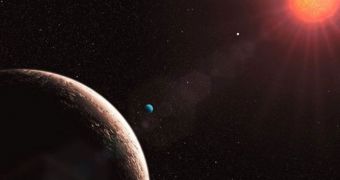The international astronomical community was less than a month ago fired up by the release of a study claiming the discovery of the first known habitable exoplanet. New data now suggest that the space body may not exist at all.
The extrasolar planet has been dubbed Gliese 581g, because it spins around the red dwarf by the same name, which is located only 20 light-years away from Earth, in the direction of the constellation Libra.
According to the study describing it, the planet had a mass that was about three times larger than Earth's, and orbited its parent star at a distance which placed it in the middle of the habitable zone.
This is the area around a star were temperature ranges are just right to allow for the existence of liquid water, a chemical that is considered to be indispensable for the development of complex life.
Our planet is located right in the middle of the Sun's habitable zone. In the case of Gliese 581g, the temperature variations on its surface vary between -4 degrees Celsius and 71 degrees Celsius.
Even if all the data seemed to point towards a bright future for the planet, astronomers at this week's meeting of the International Astronomical Union (IAU) disputed that the world even existed.
According to Geneva Observatory astronomer Francesco Pepe, his team could not confirm the existence of the exoplanet from datasets collected by the HARPS instrument.
This tool is located on the La Silla telescope, a facility operated by the European Southern Observatory (ESO) in Chile. Additional data were collected with the W.M. Keck Observatory in Hawaii.
Pepe says that his group looked over the same data as the initial team that made the announcement, but failed to find signs that Gliese 581g was there.
“Simulations on the real data have shown that the probability that such a signal is just produced 'by chance' out of the noise is not negligible, of the order of several percents,” the astronomers said.
“Under these conditions we cannot confirm the presence of the announced planet Gliese 581g,” he told colleagues at the IAU meeting, Space reports.
“I would say the detection was less than comfortably secure, even in the original Vogt et al. Paper – the paper was carefully worded, as opposed to what was in some media reports,” said Ray Jayawardhana.
“Of course, it's not easy to definitively rule out something, but the HARPS evidence is at least raising some doubts,” added the expert, who was not involved in either paper.

 14 DAY TRIAL //
14 DAY TRIAL //